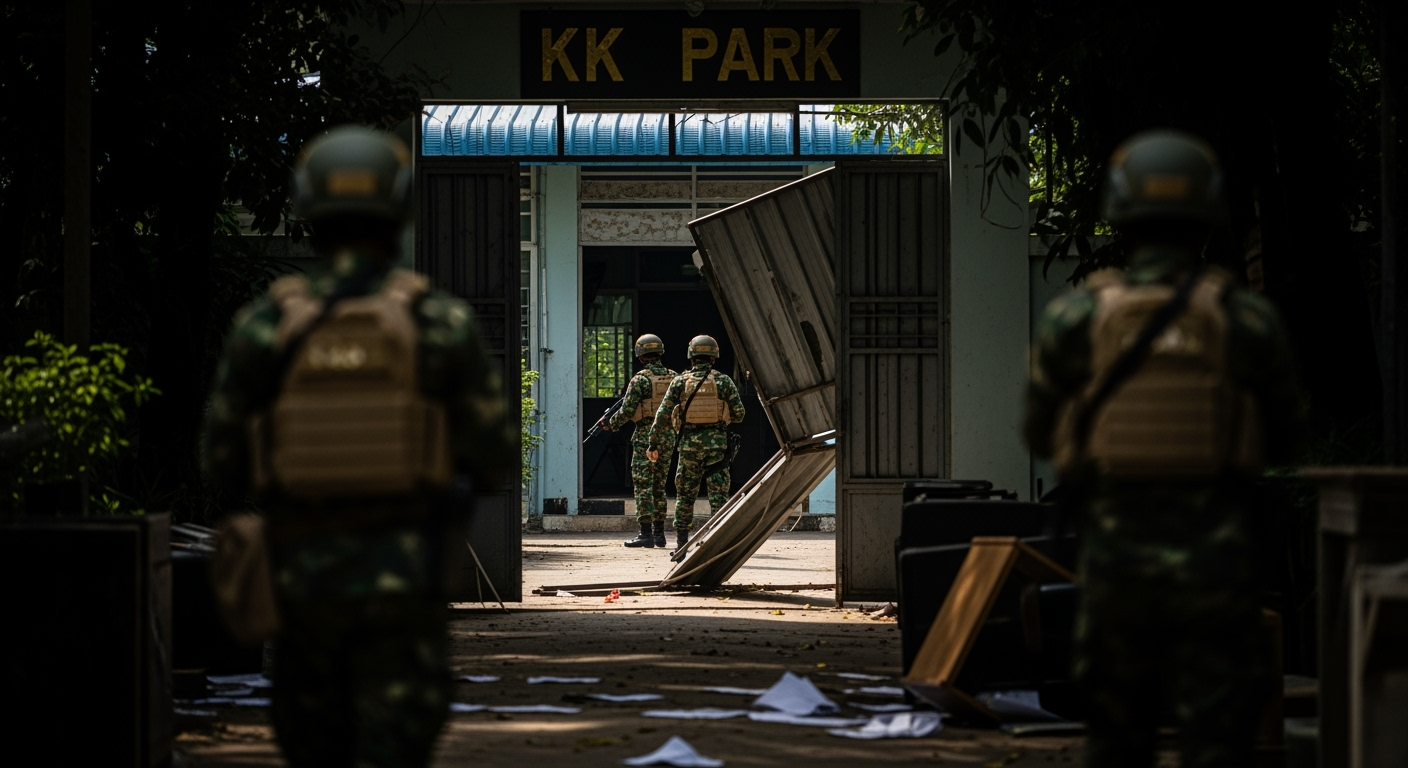Related Articles

Chess World Mourns Loss of Grandmaster Daniel Naroditsky at 29




MYAWADDY, Myanmar – Myanmar’s military has launched a significant crackdown on KK Park, a notorious online scam complex situated near the Thai border, detaining over 2,000 individuals and seizing dozens of Starlink satellite internet terminals. The operation, which reportedly commenced in early September, marks one of the most substantial actions against the sprawling cybercrime industry that has plagued the region and victimized people globally. This raid underscores mounting international pressure on Myanmar to dismantle illicit operations that have grown exponentially in the country's border regions, often operating with impunity.
State media in Myanmar reported on Monday that the military conducted extensive operations at KK Park, located on the outskirts of Myawaddy, a key trading town in Kayin State. The area, while nominally under the military government's control, is also influenced by various ethnic minority militias. The coordinated raid led to the detention of 2,198 individuals, including 645 men, 455 women, and 98 security guards, though their nationalities were not fully disclosed. Additionally, 15 "Chinese scammers" were arrested for their alleged involvement in online gambling, fraud, and other criminal activities.
A crucial aspect of the military’s seizure was the recovery of 30 Starlink satellite internet terminals, along with related equipment. These advanced terminals, part of Elon Musk’s SpaceX company, provide high-speed internet connectivity, even in remote or conflict-affected areas where traditional infrastructure may be unreliable. Reports suggest that hundreds of these terminals have been smuggled into Myanmar, enabling scam centers to maintain robust communication channels for their illicit activities. Satellite imagery and drone photography have indicated that the seized devices represent only a fraction of the total Starlink equipment present at KK Park, with one building alone showing nearly 80 dishes. State media also reported that over 260 buildings within the complex were found to be unregistered.
Maj. Gen. Zaw Min Tun, the spokesperson for Myanmar's military government, accused top leaders of the Karen National Union (KNU), an armed ethnic organization opposed to army rule, of being involved in the scam projects at KK Park. The KNU has denied these allegations, which had been previously made, stating they would investigate the matter.
KK Park has long been identified as a central hub for a range of sophisticated cybercrimes and human trafficking within the infamous Golden Triangle region. Constructed between 2019 and 2021, the complex, originally intended for border trade, rapidly evolved into a sprawling "fraud factory" and "human trafficking hub." Its operations include internet fraud, investment scams, illegal gambling, and "pig butchering" schemes—a form of romance scam often involving cryptocurrency.
The modus operandi of these centers involves luring individuals from various countries with false promises of high-paying technology jobs abroad. Traffickers prey on vulnerable populations, often from Southeast Asian nations like Indonesia, Vietnam, the Philippines, Thailand, and even China, promising legitimate employment. Upon arrival, victims' documents are confiscated, and they are held captive within guarded compounds, surrounded by barbed wire, with no means of escape. Workers are reportedly forced to endure 18-hour days, compelled to carry out online scams targeting unsuspecting individuals worldwide. Non-compliance is met with severe punishment, including beatings, torture, starvation, electric shocks, and death threats. There have been accounts of workers being "sold between scam gangs like cattle" if they failed to meet scam quotas. The sheer scale of the crisis is immense, with estimates suggesting that 120,000 people are trapped in scam centers across Myanmar alone.
The raid on KK Park highlights a much larger, insidious problem of online scam operations that have proliferated across Southeast Asia, particularly in Myanmar, Cambodia, and Laos. These centers, often controlled by transnational organized crime syndicates primarily originating from China, thrive in areas with weak governance and porous borders, such as those along the Thai-Myanmar frontier. The proliferation of these scam hubs has intensified significantly since Myanmar’s 2021 military coup, exploiting the resulting chaos and collapsed rule of law.
Initially, many of these scams targeted Chinese nationals, but as Beijing increased pressure, the syndicates expanded their reach to ensnare victims globally, including in the U.S. and other Western countries. The industry has generated tens of billions of dollars, fueling a modern form of slavery that preys on human desperation and vulnerability. Data indicates that the number of scam centers along the Thai-Myanmar border has more than doubled since 2021, with continuous construction evident in areas like KK Park, Tai Chang, and Shwe Kokko.
The crackdown on KK Park follows a period of intense international scrutiny and pressure on Myanmar to address the rampant cybercrime and human trafficking within its borders. Governments including China, Thailand, the United States, and Britain have called for action, with recent sanctions enacted against organizers of a major Cambodian cyberscam gang. In February 2025, a collaborative operation involving Chinese, Thai, and Myanmar authorities led to the release of thousands of trafficked individuals from scam compounds.
Despite these efforts, challenges persist. The fluid nature of these criminal enterprises means that even successful raids can lead to syndicates relocating their operations to other unregulated territories. Furthermore, the involvement of local armed groups complicates enforcement, as these entities often benefit financially from hosting the scam centers. The porous borders and complex political landscape of Myanmar create an environment where criminal networks can adapt and continue their illicit activities.
The raid on KK Park represents a crucial step in the ongoing battle against sophisticated online fraud and forced labor. The detention of thousands of individuals and the seizure of critical infrastructure like Starlink terminals disrupt a significant operation that has caused widespread financial ruin and human suffering. However, the sheer scale of the cyberscam epidemic in Southeast Asia necessitates sustained international cooperation and concerted efforts to dismantle the criminal networks, protect vulnerable individuals from trafficking, and bring perpetrators to justice. While this action delivers a blow to one notorious center, the global fight against these predatory operations remains far from over.